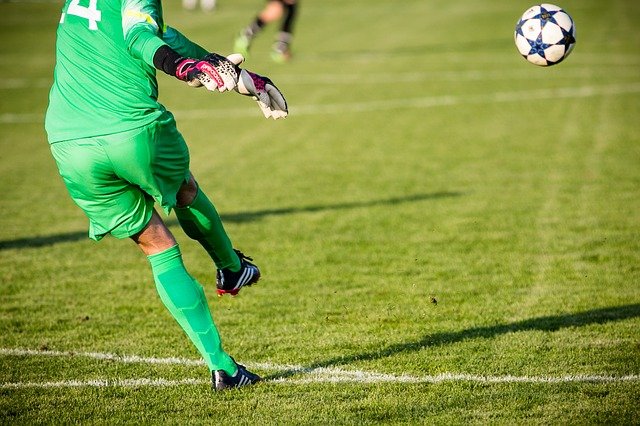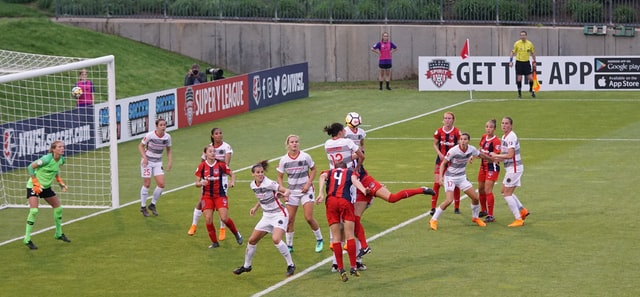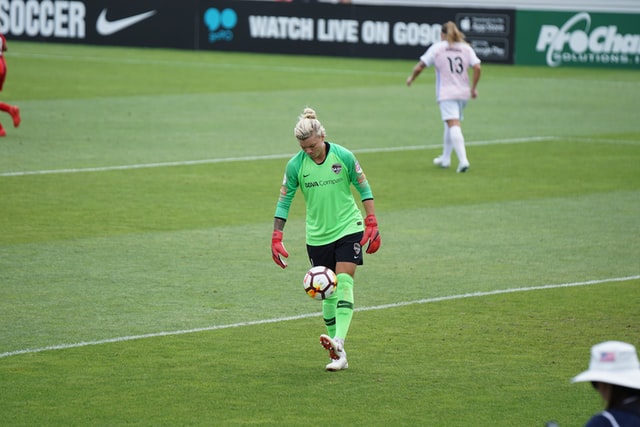As you can probably tell, a goalkeeper’s main job as a soccer player is to protect their team’s net and prevent the opponent team from scoring a goal. However, a goalkeeper’s job can sometimes go much beyond only blocking an opponent’s attempts to score.
A goalkeeper can score goals in their opponent’s net like any other player on the team. In fact, when a goalkeeper is outside their penalty area, the soccer rules treat them like any other player on the field, and they are fully capable of scoring a goal against their opponents.
The FIFA laws treat the goalkeepers like any other player once the goalie crosses their penalty area, but that does not mean that a goalkeeper can’t score a goal from their penalty area.
Goalkeepers are allowed to score even when they are inside their penalty area. A keeper can even score a goal against their own team if they want to. Many goalkeepers have scored goals against their own team by mistake throughout the history of soccer.
But what’s more impressive is when a goalkeeper scores a goal against the opponent’s team. Goals that are scored by goalkeepers in soccer are heavily celebrated and usually get a lot of media coverage when they happen because they are rare.

Here are some scenarios in which a goalkeeper may decide to attempt to score a goal against their opponents.
Goalkeepers can score during penalties and free kicks.
If you don’t know what penalties and free kicks are, you can check our own article here to learn more about them.
If your team wins a direct free kick or a penalty, you usually want to pick the player who can kick the ball most accurately to be the one who takes the free kick or the penalty.
In some soccer teams, this player might be the goalkeeper themselves. In other words, when a team wins a direct free kick, the goalkeeper might be the player chosen to take the free kick.
There are a few teams that have chosen their goalkeeper as their primary free kick taker / penalty kick taker.
Take San Paulo, a soccer team, as an example. They have once picked their goalkeeper as their free kick taker and their penalty taker. Their goalkeeper was Rogerio Ceni and he has scored 131 goals in his career, which is more goals than many soccer midfielders and even some forwards dream to score.
It’s true that making the team’s goalkeeper also be the team’s free kick taker is very rare, however it’s completely a thing.
The reason why very few teams allow their goalkeeper to take free kicks and score goals is fairly obvious.
To take a free kick, the keeper will have to be very far away from their team’s net, which means that their team will be extremely vulnerable if the opponent team manages to make a counter attack immediately after the free kick is taken.
If the goalkeeper is extremely fast however, then they might be able to run towards their goal faster once they perform the free kick, which means that the risk of conceding a goal is reduced.
Goalkeepers can score during corner kicks
A goalkeeper scoring from a header after a corner kick is extremely rare to happen in soccer, but it can sometimes happen
The reason why it’s extremely rare is because it’s even more dangerous to let the goalkeeper leave their net during a corner kick than having the goalkeeper take a free kick.
A counter attack against your own team is more likely to happen when you win a corner kick than when you win a free kick.

For that reason, most goalkeepers do not attempt to join their team into the opponent’s penalty area to try and score a header after they win a corner kick. Because if they do, they’ll be hurting their team more than benefiting it. However, some goalkeepers decide to do that under certain circumstances, and they might be able to score a goal themselves when they do.
Goalkeepers attempt to score last minute goals
This is when you’ll mostly see a goalkeeper leaving their goal and attempting to score against their opponents.
Let’s say that you’re a goalkeeper for team A, and you are competing in a final match against team B.
If your team is falling behind by one goal, and there there is less than 1 minute left, then what you should do as a goalkeeper is to leave your goal and run towards the opponent’s goal to help your team score a goal.
This is what most soccer goalkeepers do when their team is a few minutes away from getting eliminated. They leave their net and go attempt to score a goal because it doesn’t even matter anymore if they concede more goals since all they have is one last attempt to score and save themselves from elimination.
There are a few goalkeepers who managed to score last minute goals, and some of these goals were some of the most iconic goals in the history of soccer.
A team scoring a last minute goal is an awesome achievement by itself, but to have the goalkeeper themselves score the last minute goal for the team, that’s an achievement on a whole different level.
Goalkeepers might attempt scoring when their team is dominating.
During a soccer match, a team might be able to dominate their opponent to the point that the team’s goalkeeper gets the chance to play in the middle of the field.
It’s not very common for a soccer team to completely dominate the game to the point that their goalkeeper gets the chance to freely roam in the middle of the field.
However that doesn’t mean that it can’t happen, and when it happens, the goalie plays as if he/she is part of the midfield or the defense and might even get the chance to score a goal by kicking the ball from a distance.
This scenario can happen when a goalie’s team is winning by a lot, and their team is completely dominating the game.
These are the most common scenarios under which a goalkeeper usually scores a goal in a soccer match, but there are other scenarios for sure.
For example, some goalkeepers have scored goals against their opponents by mistake. When a goalie has the ball in their hands, they usually throw the ball in front of them and kick it while it’s in mid air.
The intention behind this kick is to send the ball towards one of their team players for them to attempt to score a goal, but it is entirely possible that a goal be directly scored from this kind of ball kick.
In other words, there are a few goalkeepers that were able to score against their opponent by throwing the ball in front of them and kicking it while it’s in mid air.
This type of goal is extremely rare however since the goalkeeper has to be inside their penalty area to be able to touch the ball with their hands, which means that they have to kick the ball with extreme force for it to reach the other side of the field and enters the opponent’s net. Yet a few goalkeepers have managed to do it.
Can a goalkeeper score directly from a goal kick?
According to the rules, a goalkeeper is allowed to score a goal against their opponent from a goal kick.
Also, the goalkeeper doesn’t have to be the player who takes the goal kick. For example, any other player on the team can take the goal kick themselves and not just the goalkeeper. They too can score from a goal kick.
A few goalkeepers have managed to score goals from inside their penalty area, and these types of goals usually happen when the opponent’s goalkeeper isn’t focusing or is far away from their own net.
Can a goalkeeper score an own goal?
Yes, a goalkeeper can score a goal against themselves. In fact, any player on the team can score goals against their own team. Mistakes can happen.
The soccer rules allow own goals and these goals aren’t rare. Many defenders have scored a goal against themselves while they’re trying to kick the ball away from their net.
A few goalkeepers have managed to score against themselves too. Some of these goalkeepers kicked the ball inside their own net instead of kicking it away, and others have thrown the ball inside their net instead of throwing it away. Of course, these goals happen by mistake and they are usually remembered by soccer fans for the rest of the goalkeeper’s career.
With that said, I’ll end this article with a quick summary of what you have just read.
A soccer keeper is allowed to score a goal against their opponent team. There are many soccer goalies that have been able to score goals, and some of these goalkeepers have even scored more goals than midfielders and forwards did.
The most common way for goalkeepers to score goals is by taking a direct free kick or a penalty, but there are many other scenarios in which we’ve seen a goalkeeper score a goal, and usually these types of goals are ones that are extremely enjoyed by soccer fans.

